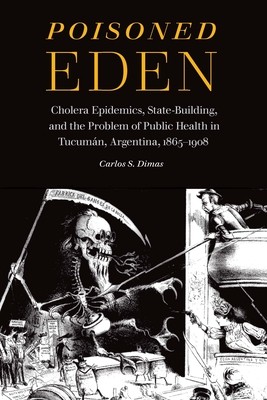
- We will send in 10–14 business days.
- Author: Carlos S Dimas
- Publisher: University of Nebraska Press
- ISBN-10: 1496228626
- ISBN-13: 9781496228628
- Format: 15.2 x 22.9 x 2 cm, softcover
- Language: English
- SAVE -10% with code: EXTRA
Reviews
Description
In 1895, after enduring two previous cholera epidemics and facing horrific hygienic conditions and the fear of another epidemic, officials in the Argentine province of Tucumán described their home as the "Poisoned Eden," a play on its official title, "Garden of the Republic." Cholera elicited fear and panic in the nineteenth century, and although the disease never had the demographic impact of tuberculosis, malaria, or influenza, cholera was a source of consternation that often illuminated dormant social problems.
In Poisoned Eden Carlos S. Dimas analyzes the social, political, and cultural effects of three epidemics, in 1868, 1886, and 1895, that shook the northwestern province of Tucumán to understand the role of public health in building the Argentine state in the late nineteenth century. Through a reading of medical and ethnographic material, Dimas shows that cholera became intertwined in all areas of the social fabric and that Tucumanos of all classes created public health services that expanded the state's presence in the interior. In each outbreak, provincial powers contended with how to ensure the province's autonomy while simultaneously meeting the needs of the state to eradicate cholera. Centering disease, Poisoned Eden demonstrates how public health and debates on cholera's contagion became a central concern of the nineteenth-century Latin American state and promoted national cohesion.EXTRA 10 % discount with code: EXTRA
The promotion ends in 20d.21:28:53
The discount code is valid when purchasing from 10 €. Discounts do not stack.
- Author: Carlos S Dimas
- Publisher: University of Nebraska Press
- ISBN-10: 1496228626
- ISBN-13: 9781496228628
- Format: 15.2 x 22.9 x 2 cm, softcover
- Language: English English
In 1895, after enduring two previous cholera epidemics and facing horrific hygienic conditions and the fear of another epidemic, officials in the Argentine province of Tucumán described their home as the "Poisoned Eden," a play on its official title, "Garden of the Republic." Cholera elicited fear and panic in the nineteenth century, and although the disease never had the demographic impact of tuberculosis, malaria, or influenza, cholera was a source of consternation that often illuminated dormant social problems.
In Poisoned Eden Carlos S. Dimas analyzes the social, political, and cultural effects of three epidemics, in 1868, 1886, and 1895, that shook the northwestern province of Tucumán to understand the role of public health in building the Argentine state in the late nineteenth century. Through a reading of medical and ethnographic material, Dimas shows that cholera became intertwined in all areas of the social fabric and that Tucumanos of all classes created public health services that expanded the state's presence in the interior. In each outbreak, provincial powers contended with how to ensure the province's autonomy while simultaneously meeting the needs of the state to eradicate cholera. Centering disease, Poisoned Eden demonstrates how public health and debates on cholera's contagion became a central concern of the nineteenth-century Latin American state and promoted national cohesion.

Reviews